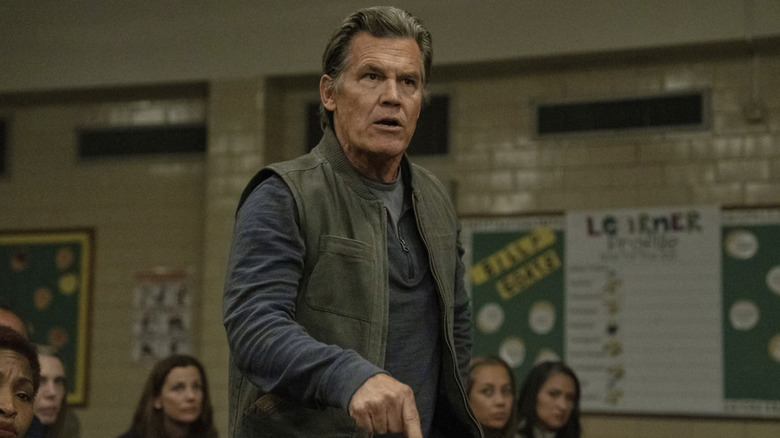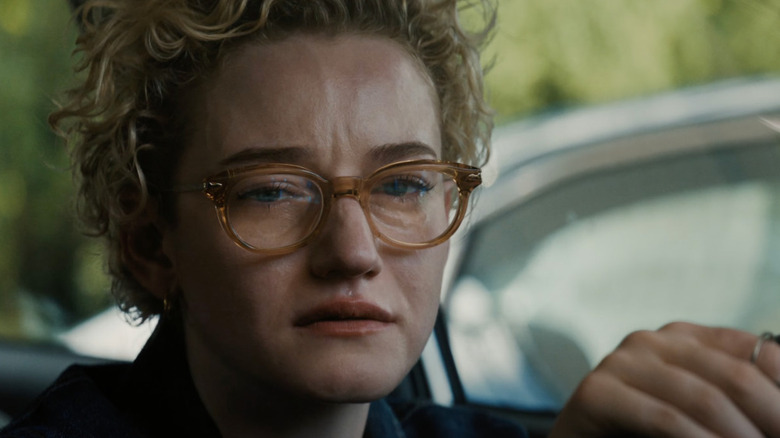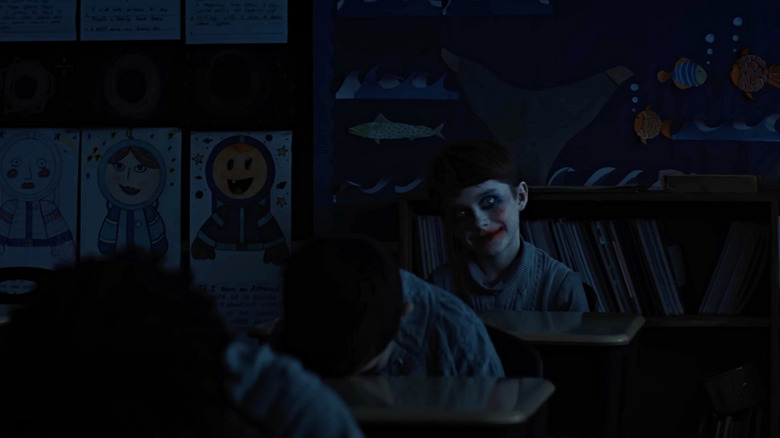Why Horror Fans' Biggest Complaint About Weapons Doesn't Make Sense
This article contains spoilers for "Weapons."
The third episode of the fourth season of "Seinfeld," entitled "The Pitch," has gone down in history as one of the finest and most incisive examples of writer Larry David's work. In it, the protagonists of "Seinfeld" — one of whom is Jerry Seinfeld, naturally — pitch fictional NBC executives on "a show about nothing," which seems like it could be riffing on how David and Seinfeld pitched "Seinfeld" to actual NBC executives. Of course, the concept of the series being "about nothing" is a pithy, self-depreciating one, and wasn't intended to be taken literally. Yet unfortunately, too many people took it to heart, and not only did they gleefully parrot the idea that "Seinfeld" was a show about nothing (when, in fact, it was a show about quite a great many things), but they saw it as validation that art could be about nothing — that not every book, song, TV show, or film was all that deep.
This is, of course, erroneous. In the same way in which all art is political, all art is about something, and it's only the degrees of a work's depth that are in question, not its presence. If there's a genre that's continually been dismissed as "not that serious" over the decades, it's the horror movie, as people made a habit out of believing the genre to be all surface, no feeling. Fortunately, that reputation has turned around in a big way recently, as horror has steadily become more mainstream and fans of the genre have made sure to point out its credibility as loudly and as often as possible. The indie horror movement of the early '00s eventually mutated into the "elevated" arthouse horror films that have only increased in popularity, films in which the existence of its own subtext is so pronounced that it's practically a selling point.
It's tempting to say that these movies have trained viewers to be spoonfed depth in a similar fashion to how streaming service series have been edited to allow people to multitask while watching, but that's not true. There is a media literacy problem at the heart of the biggest complaint about Zach Cregger's new horror film, "Weapons," however. The complaint — that the film is about nothing — is an invalid criticism, one which people are leveling at the film because they cannot articulate what's actually bothering them about it. "Weapons," like "Seinfeld" and all other art, is indeed about something, yet its structure is so deliberately unusual that it's made it an unfulfilling experience for some people, causing them to make specious claims about its content.
Zach Cregger intentionally fails to provide emotional catharsis in Weapons
There exists a phenomenon where people cannot seem to see the forest for the trees when criticizing a film, and end up hyperfocusing on a particular point without analyzing the bigger picture. So far, the discourse surrounding "Weapons" is focused on one main component: the film's hype. It's been the albatross for many a film's reception recently, as studios keep shifting the movie business to focus on a film's opening weekend only, and publicists follow suit by moving pre-release buzz away from thoughts of a film's longevity and depth, and are increasingly using influencers to shove hype moments and aura in everyone's faces instead. As with anything that's sold on hype, the reception becomes bifurcated, with people either joining in the zealotry or having an equally negative reaction to it.
The point of contention most detractors of "Weapons" are currently focusing on is a supposed lack of depth or cohesion in the movie, which is a misreading of the film. Some of these criticisms are erroneous in and of themselves, the type that tend to crop up whenever a narrative involves a central mystery. Some folks just don't like the answers to the evocative questions, and deride a film for what it isn't. Yet the criticisms that accuse "Weapons" of being slight or otherwise unfulfilling are more than likely responding not to the movie's story, but its structure. Zach Cregger splits the narrative of the movie into six segments, each of which are primarily focused on one particular character's point of view. Unlike a standard anthology structure, however, Cregger is not telling mini-stories within one larger story; instead, each segment is a part of a larger puzzle, and cannot be understood separately. To underline this, Cregger does not "end" each segment conventionally, but rather leaves each one hanging on a note of either uncertainty or suspense.
This choice robs the audience of having an emotional catharsis with each segment before they're moved onto the next one, and it's all part of Cregger's game of manipulation (which, not coincidentally, is a major theme of the movie). Even at the film's climax, while there is undoubtedly a moral catharsis thanks to the unscrupulous witch Gladys (Amy Madigan) being literally torn to bits by the children she put under her spell in order to siphon their life-forces, Cregger still keeps an emotional payoff at bay. Alex (Cary Christopher) has saved his parents but is no longer actively in their lives given that they're in a vegetative state. Justine (Julia Garner) is alive and cleared of all wrongdoing, but her boss and her lover are both dead. Archer (Josh Brolin) has found his beloved missing son, but the boy's mind is still lost in a fog of the witch's spell. The story ends, the mystery is fully explained, and yet nothing has been resolved ... and that's just as Cregger wants it.
Weapons is about many things while being straightforward
It's certainly understandable and valid for someone to be let down by "Weapons." That's possible with any film, but especially one like this, which bucks formula so much that it needs to be experienced in its entirety to be fully understood and scrutinized. The movie is deliberately constructed to keep viewers guessing until the end, even as it plants clues early on that foreshadows (if not telegraphs) the eventual answers — the word "WITCH" being painted on Justine's car near the beginning of the film being the biggest tell. "Weapons" is full of such subversions, one being the way the story doesn't have a twist in it like an M. Night Shyamalan movie or even Cregger's "Barbarian" does, where you think you're watching one thing but you're actually seeing another thing. Instead, "Weapons" has a largely straightforward narrative, one that's just been loaded with mini-mysteries thanks to its unique structure.
Like any puzzle movie from "Rashomon" to "The Prestige," "Weapons" is best analyzed upon multiple viewings, allowing the game of its jumbled structure to not hang over the experience. With that out of the way, the film's themes and meanings become much more apparent. One could view the movie through the lens of a cautionary tale for people ignoring or paying lip service to collective tragedy: Justine and Archer, the two people in Maybrook who are the most actively concerned about the missing children, have nightmares about the mystery, and are the two adult survivors of the film. Paul (Alden Ehrenreich) and James (Austin Abrams), the two least concerned about the missing kids, do not fare so well. Marcus (Benedict Wong), a man who is only concerned about the kids as far as his job requires him to be and no further, is turned from a force for good into something destructive. This is just one interpretation; Cregger has made the film dense enough to allow for multiple readings.
Although Cregger has confessed to putting imagery into the film whose meaning even he isn't sure about, this doesn't mean that it has no meaning. On the contrary, such subconscious imagery and concepts can have numerous meanings. Though "Weapons" is not a surrealist work, it nonetheless uses symbolism in a similar fashion to the films of David Lynch. It's ultimately an urban fairy tale, something you'd think would be obvious given the presence of an evil witch and a narrator (Scarlett Sher) who is a literal child. In addition, Cregger has also been vocal about how the film was partially inspired by the loss of one of his dear friends, Trevor Moore, who along with Cregger used to be a part of the sketch comedy troupe The Whitest Kids U'Know. Clearly, "Weapons" is not a movie with nothing on its mind, and is actually about a great many things. Whether you think it works or not is up to you; just be sure not to confuse something for nothing.
"Weapons" is in theaters now.


